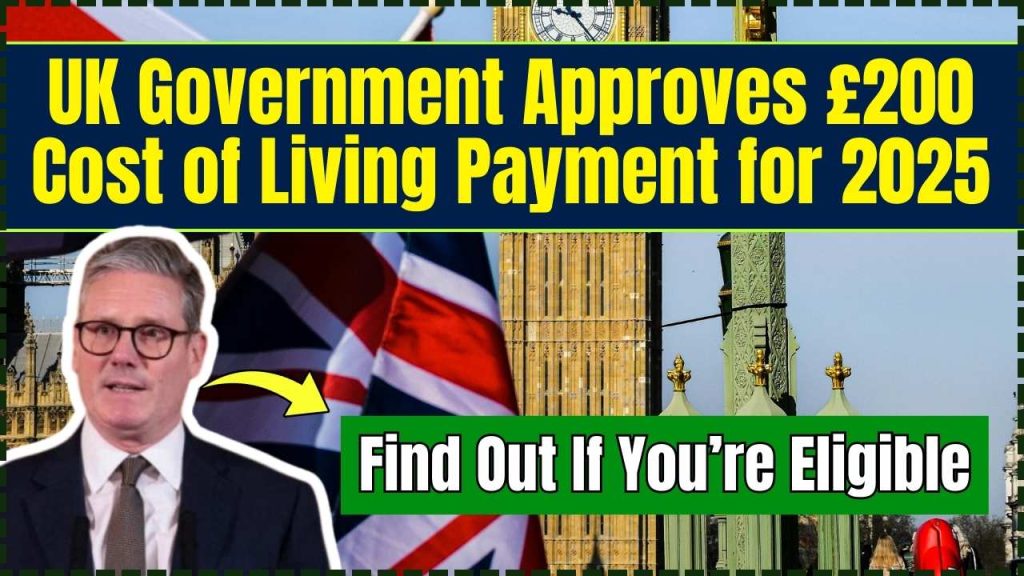£200 Cost of Living Payment for 2025: The UK Government has officially approved a £200 Cost of Living Payment for 2025 to support millions struggling with rising everyday costs. Whether you’re grappling with high energy bills, grocery costs, or housing expenses, this payment is designed to offer relief. But the big question is: Are you eligible for the £200 Cost of Living Payment, and how can you claim it?

This comprehensive guide breaks down everything you need to know, in simple terms, to help you access the payment smoothly. Plus, we’ve added expert insights, practical budgeting tips, FAQs, and real-life examples to make it even easier!
£200 Cost of Living Payment for 2025
| Key Details | Information |
|---|---|
| Payment Amount | £200 one-off payment |
| Eligibility | Varies by council; generally includes low-income families, benefit claimants, pensioners |
| Application Mode | Through local councils in England |
| Key Benefits Considered | Universal Credit, Pension Credit, Income Support, Housing Benefit |
| Application Deadline | Varies by council (Check local council’s official website) |
| Additional Assistance | Household Support Fund, Energy Bill Grants, Food Assistance |
| Official Resource | UK Government – Benefits Checker |
The £200 Cost of Living Payment 2025 is a timely initiative by the UK Government to cushion vulnerable households against rising expenses. By understanding eligibility, applying correctly, and using the funds wisely, you can make a real difference to your financial stability.
Don’t wait—check your local council website today and apply before it’s too late!
Why the UK Government Approved the £200 Cost of Living Payment for 2025
UK households have faced sharp increases in energy costs, groceries, rent, and daily essentials over the past few years. Global inflation and supply chain disruptions have further worsened the cost-of-living crisis.
In response, the government introduced the £200 Cost of Living Payment 2025, specifically targeting vulnerable households. It’s part of a wider strategy to prevent financial hardship and ensure basic needs are met.
Who is Eligible for the £200 Cost of Living Payment in 2025?
1. Low-Income Households
Many councils focus on assisting households earning under £20,000–£30,000 annually (exact income limit varies).
2. Benefit Recipients
If you’re receiving any of the following benefits, you may qualify:
- Universal Credit
- Pension Credit
- Income Support
- Housing Benefit
- Jobseeker’s Allowance (Income-based)
- Employment and Support Allowance (Income-related)
3. Pensioners
Pensioners on fixed incomes or Pension Credit may be prioritized.
4. Households with No or Low Savings
Applicants with savings below £6,000 to £10,000 are often eligible.
How to Apply For Cost of Living Payment?
- Check Local Council Website: Use Gov.uk Council Finder to locate your council and read eligibility details.
- Prepare Documents: Typical documents include:
- Proof of income (pay slips, benefit statements)
- Bank details
- Proof of address
- Complete Application: Submit online or paper forms as per council instructions.
- Submit Before Deadline: Deadlines vary, but applying early increases your chances.
- Receive Payment: Usually processed within 2-4 weeks, directly to your bank account.
Pros & Cons of the £200 Cost of Living Payment
| Pros | Cons |
|---|---|
| Direct, one-off financial relief | One-time payment—may not cover long-term needs |
| Doesn’t affect your benefits | Eligibility criteria vary, causing confusion |
| Quick processing (within 2-4 weeks) | Deadlines and fund limits—risk of missing out |
| Available to benefit claimants & low-income families | Some councils require detailed paperwork, which can delay process |
Common Mistakes to Avoid
- Missing the Deadline: Each council has its own closing date—check early and apply immediately.
- Incomplete Applications: Submit all required documents (proof of income, benefits, address).
- Not Checking Council-Specific Criteria: Eligibility differs; don’t assume one-size-fits-all.
- Overlooking Savings Cap: Exceeding savings limit may disqualify you—know the threshold.
Expert Insights
“While the £200 Cost of Living Payment offers short-term relief, households must focus on budgeting smartly. It’s crucial to combine this support with local initiatives like the Household Support Fund,” says Mark Harris, Financial Analyst at MoneyAdviceService.org.uk.
He further suggests using official tools like the UK Government Benefits Checker to uncover additional entitlements.
Real-Life Testimonials
Sarah, Single Parent:
“I applied online through my council’s website and got the payment within 3 weeks. It helped me clear my overdue electricity bill.”
James, Retired Pensioner:
“My pension barely covers groceries. This extra £200 eased the burden and gave me some breathing space.”
How Does This Payment Impact Long-Term Financial Stability?
While £200 won’t resolve systemic inflation, it:
- Offers temporary relief during peak hardship.
- Bridges gaps for households between rising costs and limited income.
- Complements broader support measures like the Household Support Fund (HSF) and Energy Bill Discounts.
However, experts caution against depending solely on one-off payments. Long-term strategies like upskilling, energy efficiency, and savings habits are key.
Smart Budgeting Tips: Make the Most of Your £200 Payment
Here’s how you can stretch that £200:
- Clear High-Priority Bills First: Pay off urgent utilities or rent arrears.
- Stockpile Essentials: Buy non-perishable groceries or household items in bulk.
- Use for Emergency Fund: Start or top up your savings buffer.
- Invest in Efficiency: Purchase energy-saving bulbs or insulation materials to reduce future costs.
Additional Assistance: Household Support Fund (HSF)
The HSF remains open in 2025, offering:
- Energy bill grants
- Food vouchers
- Rent arrears support
2025 DWP Benefits Update: Check Important Changes UK Families Must Be Aware Of!
DWP Confirms £175 Support for Pensioners Facing Fuel Payment Gap: Are You Eligible?
FAQs About £200 Cost of Living Payment for 2025
1. Do I need to pay taxes on the £200 payment?
No. It’s tax-free and doesn’t affect your benefits.
2. Can two people in the same household apply?
Generally, one payment per household, but check your council’s rules.
3. How long will it take to receive the payment?
Typically 2-4 weeks after successful application.
4. What if I’m rejected?
You can appeal or seek other local schemes like HSF or food assistance programs.
5. Can I get help with the application?
Yes! Local Citizens Advice bureaus and council support centers often offer free assistance.











